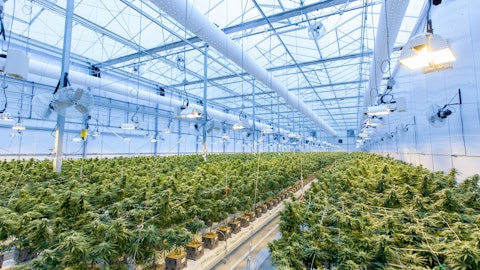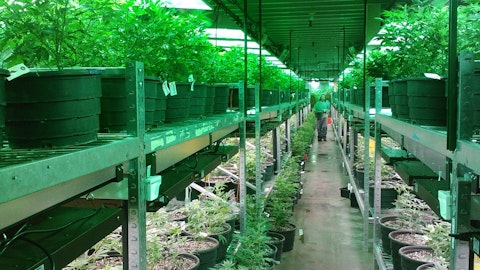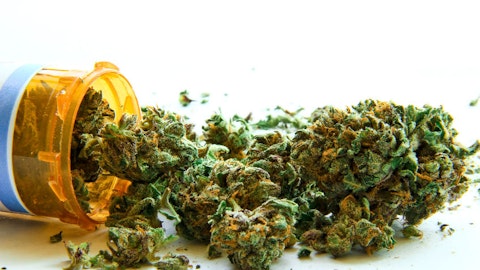Michael DeGiglio: Yes, Australia has really ramped up considerably. We’re very pleased with the results in Australia and looking at New Zealand as well. On the European side, it’s just been a long process to really get into Germany, we’re ready to go, we finally got our permits, actually last week, and it’s really to hold up more on the Canadian side. Sometimes it can take 30 to 60 days, and I want to elaborate much on it. But it’s crazy, but that should be forthcoming. Israel has gone very well for its shipment. We’re actually in pharmacies right now. We’ve seen pictures of consumers that are happy. So we’re excited to see where that can ramp up. And then the UK and be — we’re going to ramp up in the UK very quickly. That’s all that work has been done there.
So we hope to announce something there in the coming months. And then yes, there’s an array of companies in the EU, we kind of not looking at the EU as a whole but surgically looking at different countries because they’re all somewhat different. And our plan is to be in all those companies — countries as well, looking forward in €˜23 ’24. As far as the Netherlands? We’re still focused on the Netherlands as you know all the export out of Canada’s for medicinal purposes. You cannot export a rec, even though a lot of the strains are the same with the Netherlands being the first rec market, the true first large rec market cultivation will be in country there. And as you know, we’re one of the 10 license holders. So we hope to start ramping up that facility this year and looking at generating revenues in ’24.
Unidentified Analyst : Got it. That’s it for me. I appreciate the color.
Operator: Thank you. Please. Our next question will come from Eric Des Lauriers of Craig-Hallum Capital Group, your line is open.
Eric Des Lauriers : Good morning. Thank you for taking my questions. I was hoping to just get a bit more information on the divestiture of the Texas asset, because you just help us understand maybe the financial impact that you’re expecting to have on your overall costs in the Produce business? Or if you don’t want to give that sort of detailed information, maybe just remind us what percentage of that Texas footprint this facility was. And just maybe your overall thoughts kind of going forward with respect to this divestiture? Thanks.
Stephen Ruffini: Eric, this is Steve. So, that facility is 30 acres, we’re currently growing on 10 acres based on our current consumer demands, our retailer demand. So based on that footprint growing in the third of the greenhouse, it’s not let’s say it’s not our most efficient Texas operation currently. And one of the reasons that we’ve made the decision — we’ve made. Yes, one of our we have — we are one of three growers who grow a specific crop in North America, that’s licensed, I won’t mention what it is that, it’s been predominantly the crop grown there. That seed company has decided and not probably going to be looking at developing resistance in that. And so we’re not sure we’re going to actually be in that crop going forward. And that was predominantly what was grown there. But we do have the capacity, as I said, in our other locations where we have over 100 acres, and that’s expandable, so probably not going to elaborate more today on that.
Eric Des Lauriers: Okay. Could you perhaps help us understand, which will have a greater cost impact on the Produce business, this divestiture or some of those technology and innovations that you guys are implementing?
Michael DeGiglio: Yes, we learnmore AI in our growing system, it’s pretty proved that really well, we spent about a year on one of our facilities, and now we’re bringing it to all the facilities in Texas and probably looking at Canada. One of the things we bet on, if you look at the — when I — my comments were really tied to how do we look at the U.S. market? When you look at the success in the Canadian market, taking existing assets that were used for produce and converting them to cannabis, we were able to do that, I think better than anyone else, because building a new facility from the ground up, besides a huge capital cost today, can take three to five years to ramp up. And I think if you look at the Canadian landscape, today, going back over five years, you’ll see that there’s been a tremendous difficulty in many companies who are new to — not just new to the agricultural industry, but have brand new assets, it takes a tremendous amount of effort to get to a point of operational excellence, where you’re generating profitable outcomes in training your people and ramping them up the attrition rate, understanding the tool, understanding the climate.
When you have an existing facility with tremendous climatological data that you can rely on a very experienced team, not just at the grower level, but all the way through the organization, that ramp up is compressed. And that resulted in us being able to grow organically. So, when we look at these assets in Texas, and again, we believe that they eventually will be interstate commerce. And that the model in the United States today to a great degree is an experimental model that will change upon comprehensive legalization that we would be in a very strong position to win large scale, low cost high quality. So, that’s why again, we’ve kept our optionality not just for Texas, but for the U.S. market. So this asset for cannabis would probably be the last one we would ever convert because it’s outside of the main hub of our assets.
And that’s one of the reasons we’ve decided to reduce this asset. So, cost savings going forward, one of the biggest instances I mentioned was the control of the virus resistance is being built in. There is somewhat — some level of resistance today in the varieties. And I think there’ll be constant comprehensive resistance in all the tomato varieties. And you know, this virus has affected tomato growers all throughout the world by 2025. So it is being solved, I mean, the virus will be no more eventually. But in the meantime, we have these protocols. And the point I wanted to mention is when we thought we had optionality on some specific assets in Texas that we would convert. We then spend a lot of our normal capital in those assets, because we would just it would just be sunk costs on a conversion to another crop, in this case, cannabis.
So we’ve made those corrections now, since we don’t know what the future holds for federal legalization in Texas. So we’re back to focusing on our yields, operational excellence that we’ve had customer assessment, and we think a combination of those attributes will start to drive positive results on Fresh. Not to mention, always looking at alternatives of what we can grow the mean, we are a controlled environmental agricultural company. And we have the ability to excel in many different crops as well.





